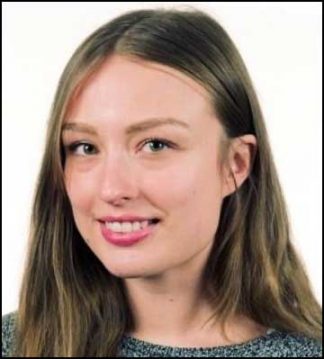By Allison Campbell-Jensen
For their Entrepreneurship in Action course, four student teams met virtually with their advisory group March 8 to present their proposed companies. This Carlson School of Management two-semester course gives undergraduate students hands-on experience in launching a new company — including interacting with attorneys, bankers, and other professionals, as well as Carlson faculty and experienced entrepreneurs.
Another key profession to help them along the way: Librarians.
At the meeting, one team presented on a new virtual reality market. Another focused on peer-based activities to promote student well-being. A third celebrated coffee in a new way. And the fourth took a fresh look at medical devices that assist mobility.
The fourth group — Steven Bleau, Morgan Kerfeld, Rick Pradhan, and Elizabeth Urbanski —re-oriented the usual walker set-up so that the user would face forward. Moreover, it would be stylish. And, importantly, by integrating load cells and wheel encoders directly into the device, the team is able to measure speed, distance, and weight put on the handles.
“With these simple metrics, we can give our users a better understanding of their activity by setting baselines and passively measuring their mobility progress and trends,” the team wrote. “Giving people a better understanding of their activity will not only allow them to challenge themselves and hit their goals but also give them a better understanding of how they use their energy allowing them to spend it where they like.” They also hope to encourage activity to prevent falls.
Investigating markets
Prior to the meeting with the advisory board, third-year senior Pradhan had the task of figuring out the market opportunity for the product. “I needed to figure out a beachhead market, the existing target market, and then the overarching potential blue ocean market,” he says. “Those three numbers were hard to come by because who we are designing for is very specific, but it could be applied to a wide group of people.”
First he emailed course instructor John Stavig, who suggested he try the University Libraries. He got in touch with Maggie Parra, Business Reference & Information Services Associate.
“I helped him to navigate databases like IBIS World, EMIS Professional, BCC Research, & others from our Market Research guide,” she says. The reports and statistics broke down the market projection for the mobility device industry by product types, like walkers, crutches, canes, and so forth.
Then Pradhan wanted figures on the population of people with multiple sclerosis, cerebral palsy, Parkinson’s disease, age-related issues, or other conditions that might benefit from their company’s new device. Parra and a colleague from the Health Sciences Library were able to help him access information from such sources as the CDC and Statisca.
“I couldn’t say thank you enough to her,” says Pradhan of Parra. “She was able to answer all my questions within a couple of hours.”
Facilitating access
“I couldn’t say thank you enough to [Parra]. She was able to answer all my questions within a couple of hours.”
—Rick Pradhan, CSOM undergrad
Parra adds: “The library’s business collection includes high level databases that are in-demand for professionals and the companies involved in these projects. Working directly with these courses, we aim to provide outreach on the availability of these resources and demonstrate techniques for navigating the specialized features.”
Her colleague Business Librarian Caroline Lilyard notes that Carlson offers other experiential courses — from the Enterprise Programs (Funds, Brand, Consulting, and Venture) and the Masters in Supply Chain Management — that call for these resources and research skills. Librarians’ involvement varies, she says, but “the commonality is that the student groups are working with real-world clients and use secondary business research as a critical component of their outcomes.”
Nonprofit organizations and government agencies are among the clients of these Carlson School teams, says Mary Schoenborn, Business and Public Affairs Librarian, so along with business resources, public policy materials are increasingly important for these students’ projects.
And Librarians have an important role in facilitating access to these resources. Says Parra: “It’s great working with students from these hands-on courses as they have a clear idea of the product or business plan they’re working towards and are goal oriented.”






